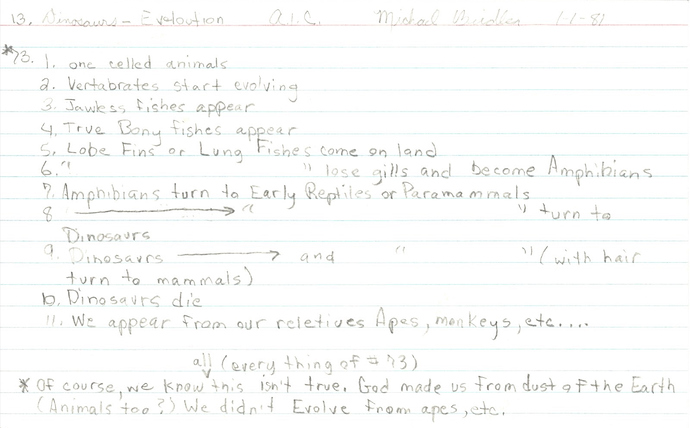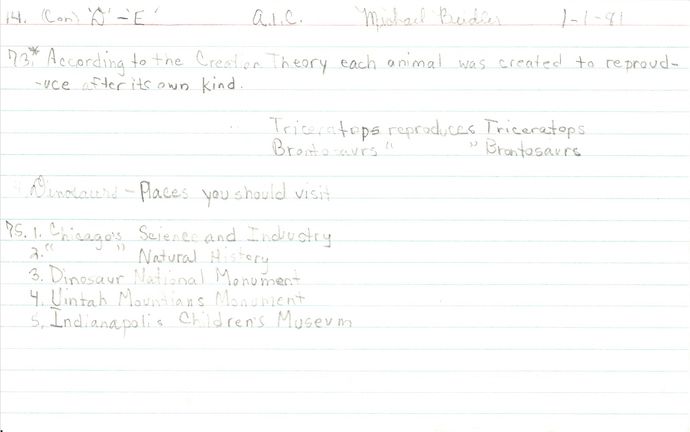This is a companion discussion topic for the original entry at https://biologos.org/blogs/guest/genesis-paradise-lost-a-tale-of-false-dichotomies-and-missing-voices
This is a companion discussion topic for the original entry at https://biologos.org/blogs/guest/genesis-paradise-lost-a-tale-of-false-dichotomies-and-missing-voices
I’d be cautious about placing Keller on that list, since his views on evolution seem to be a confusion from what I’ve seen.
Thank your for this. Do you think that the strident tone of YEC (and some others) is, at bottom, a fear of falling short in God’s sight; and that some would not go to Heaven as a result? I know that Ken Ham doesn’t feel that you lose your salvation from holding evolutionary views, but does feel that it’s a salvation issue in that it supports his view of the first and second Adam (as in Four Views on Creation, Evolution and Intelligent Design."
I wonder if it would help to minimize fear by posting a review of works such as Greg Boyd’s book, “The Benefit of the Doubt,” and his 7 reasons why God welcomes our use of healthy questioning. Boyd points out that belief alone isn’t that important to God–why would he value someone who forgets the intellect God gave him, or is ignorant of the world around him, just to believe in a given thing?The universe is so vast, and our grip on understanding its totality so limited, that God is understands where we stand, and meets us where we are. Thus, the honest person who sees no evidence for God may be ahead in his relationship to God’s goodness, while the lip-serving Christian who doesn’t care his neighbor but invests in church like fire insurance may be less close. George Macdonald, too, illustrates the 2 people meeting on a hillside: 1 is going downhill, and the other up–but while their current position is the same, the focus is entirely different. This also mirrors images of C S Lewis from “The Great Divorce” and the Heaven portion of “The Last Battle,” specifically of Emeth, the Calormene who served Aslan all his life without knowing it.
Psalm 103: 13: As a father has compassion on his children,
so the Lord has compassion on those who fear him;
14
for he knows how we are formed,
he remembers that we are dust.
I wonder if review of authors such as Boyd, Lewis and Macdonald would help take the fear and anger out of discussion. Thanks.
Randy, that would be great if it did, but I am not hopeful regarding the major players. On an individual basis, it is certainly a good thing to do. I think there is a lot of angst in the young earth position, and see in some of the comments here by those of that viewpoint that they are distressed and conflicted over the issue. The pain is evident. Certainly for those, focusing on the broader picture of the Bible and Jesus is helpful, not only to find common ground, to also to expand the view of our relationship with God beyond the first few chapters of Genesis. While the purpose of Biologos is focused on the science-religion interface, it certainly impacts on the broader theological issues and we have to reach beyond the boundaries of this site at times to find understanding, as you suggest.
Such topics that involve worldview impact our sense of self, and impact people in that they have to reexamine their life, their life’s work, their impact on others and the consequences of their actions. It may also impact their livelihoods. As such, there is little wonder as to why we see such distress. I think our calling a Christians is to respond with love, to turn the other cheek when appropriate, and help carry the burden, though that is sometimes difficult as we have the same investment, and I am as guilty as anyone about snark and confrontation at times. If it were easy, Jesus wouldn’t have had to tell us to do it.
is it possible that GP:L has drawn the battle lines of the origins debate in the wrong place?
Who’s drawing battle lines? They’re wrong exactly as much as they’re wrong, but obviously they don’t think they’re wrong. Shouldn’t they get credit for that position? If you want to draw battle lines, should you push it off onto them?
No, he’s fine on that list. It’s not a list of people who subscribe to evolutionary creation as seen by BioLogos, it’s a list of Bible-believing Christians who are not Literal Six Day Young Earth Creationists.
You could quite easily add people such as Hugh Ross and Michael Behe to the list. They may have their differences with BioLogos, but they aren’t LSDYECs either.
I have to admit, I smirked at the double-entendre of LSD here (of the “what are you smoking??” type). Granted, not a very gracious joke, but pretty humorous to me.
I have to admit I read it LDSYEC and was wondering why Mormon YEC adherrents were referenced.
Do you think that the strident tone of YEC (and some others) is, at bottom, a fear of falling short in God’s sight; and that some would not go to Heaven as a result?
Randy,
Having worn YEC shoes for decades, I can tell you that my strident tone came from a personally-held belief that my particular interpretation of Genesis (and related passages) was the only possible interpretation. To even suggest that some nuanced, culturally-informed interpretation could be superior to my “plain, literal” interpretation seemed to go against the grain of the doctrine of Scripture’s perspicuity in everything upon which it touched, forgetting, quite conveniently, that even the author of 2 Peter saw in Paul’s writings things that were “hard to understand, which the ignorant and unstable twist to their own destruction, as they do the other Scriptures” (3:16 ESV).
While I didn’t doubt that people who believed in evolution (or even the Bible’s non-inerrancy) could be saved, I couldn’t fathom how it is that they resolved the tension. I pretty much thought they were crazy, ill-educated, or (at worst) carelessly negligent in their treatment of the Scriptures.
I wonder if review of authors such as Boyd, Lewis and Macdonald would help take the fear and anger out of discussion.
I’m not convinced reviewing Boyd or MacDonald would help much, especially given their association with open theism and universalism, respectively. As a YEC, I refused to listen to folks who quoted either theologian. Lewis, however, is a different story, especially considering that everyone wants to claim him as their own.
Who’s drawing battle lines?
YECs are drawing the battle lines in the wrong place: the church. These misdrawn battle lines, which result from poor hermeneutics, make the most bloody conflicts occur within the church. Proper hermeneutics move the battle away from Scripture (e.g., the Bible is not a science textbook) and put the battle more solidly in the realm of philosophy of science and metaphysics (e.g., our universe is knowable, but why?), where such debates belong.
Thank you for that insight.
I see the problem. JPM also pointed out the need to avoid alienation with too much theology (perhaps especially on Biologos, where the focus is on science); I understand. I agree that modeling understanding and Christlikeness will help better than abstract reasoning.
I remember my first time of running into a Christian evolutionist. As a missionary kid who had just read one of the YEC books and was answering evolution oriented test questions on my University of Nebraska-Lincoln high school correspondence tests, I felt I had to write a YEC answer in the margin of each query. The teacher in the US became understandably a little frustrated and explained that I was answering cynically, that she was a Christian too, and I needed to think things through. I was shocked because I realized she was right. I wrote an apology to her, but they changed teachers on me. I always felt bad about that, but her kind though blunt response really started me to thinking that there were other options out there, and good people on the other side. I even tried to reach her with an apology, but never could find her again.
Looking back at that made me more determined to treat someone from another point of view with understanding (though I haven’t been perfect at that by any means).
Thanks for your insight. It looks like you know your writers well. I do have a book, “Unspoken Sermons,” including the tolerant “Justice” by MacDonald with a foreword from CS Lewis saying he agreed with Macdonald’s worldview. No one is completely consistent, so probably as with Augustine, both conservative fundamentalists and liberal universalists can claim part of Lewis’ legacy 
BTW, Khuda hafez.
Right there with you. I wish I could apologize to the guy who introduced me to the Documentary Hypothesis about the Pentateuch’s origins. Boy, was I a basket case to him!
Just curious, so I jumped in here: How can fundamentalists claim part of Lewis’s legacy? He defended a certain kind of historic orthodoxy, but on a good many points, he was quite far from American fundamentalism… but perhaps I’m not thinking of the right parts of his work so as to agree with you here.
Mike’s in Iran?
Thanks. I’m not sure I can put a finger on Lewis’ fundamentalism other than the Chronicles of Narnia. 
I saw that the author had had a degree in Farsi. That’s all I know in Farsi, from a neighbor of mine in Detroit! I like seeing the international experience–it seems to help with understanding. Wasn’t there a review on learning a second language, that it helps with empathy? Wish I knew more. Thanks.
As a missionary kid who had just read one of the YEC books and was answering evolution oriented test questions on my University of Nebraska-Lincoln high school correspondence tests, I felt I had to write a YEC answer in the margin of each query.
Funny you should mention this! I did the same in elementary school. I’ve attached some photos of notecards I created for a presentation on dinosaurs:
خُدا حافِظ
Thanks (متشکرم), Randy!
AM,
Fundamentalists claim as valid many of Lewis’ arguments, as set forth in Mere Christianity. In this way, they claim him (ignorantly or grudgingly) as their own, but mostly because (1) they’ve never read the entirety of the book (or else they would have been shocked at Lewis’ accommodation of evolutionary theory) and (2) they are unaware of the influence folks like George McDonald had on Lewis’ thinking. It wasn’t until I began delving into Lewis’ scholarship and started reading his entire bibliography (I’m about 1/2 of the way through) that I fully comprehended how un-“Evangelical” Lewis was. Up until that point, I thought he would have fit in fine in my Southern Baptist church (except for the smoking, drinking beer, and occasional cursing, which I chalked up to British behavioral norms).
Didn’t you mean خُدا حافِظ, with a ظ? Or is there another version without the ظ? ![]()
#learning

